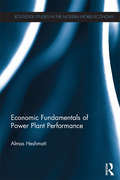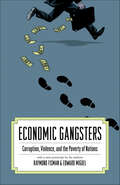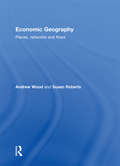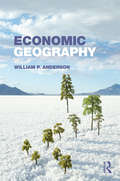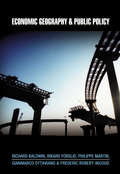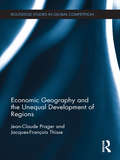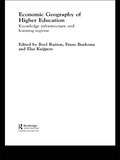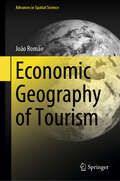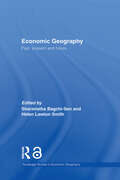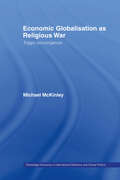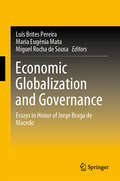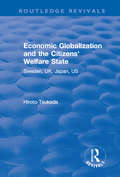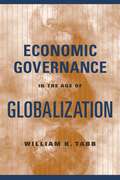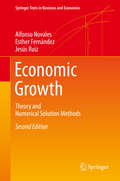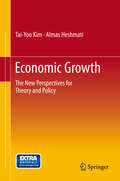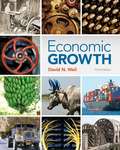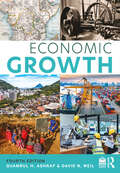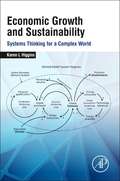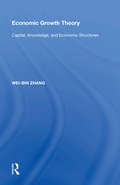- Table View
- List View
Economic Fundamentals of Power Plant Performance
by Almas HeshmatiStability of the electricity industry is crucial for economic growth of all nations. Sustainable economic growth cannot be accomplished without secured energy supply. The book underlines how management of the electricity industry should be conducted and the efficient form of electricity market structure. The book also studies the electricity industry in Korea which has been a strongly supportive and vital factor in the economic development of Korea for the last few decades. The book focuses on the three market players of the electricity market and they are the suppliers, consumers and the government-related organizations. It includes detailed information on generation and finances at the generator level and analyzes the efficiency differences among generators, plants and business units by using different performance measurement methods. It identifies and analyzes different production factors' effectiveness and relationships in generation. The comprehensive analysis helps to provide explanations in the differences in the performance of the studied units. The book also discusses the implications of the findings for future resource allocation and how we can further enhance the efficiency of the industry. The book will appeal to those interested in energy and energy policies, as well as researchers and practitioners in the economic development and electricity and utilities industry.
Economic Gains from Trade: Comparative Advantage
by Nancy F. Koehn Robert E. KennedyHow nations trade and whether they benefit from it are two of the oldest and most important questions in political economy. In the 170 years since David Ricardo formally developed the theory of comparative advantage, it has become one of the principles most widely accepted among professional economists. Despite this wide acceptance in the professional community, the basics of international trade are still poorly understood by many policy makers and casual commentators. This note introduces the theory of comparative advantage. It is divided into four sections. The first presents a short history of the concepts behind comparative advantage. The second develops a simple model with several examples to demonstrate the gains that result from trade between nations. The third briefly covers several extensions of the simple model. Finally, two traditional objections to free trade are reviewed. A rewritten version of an earlier note.
Economic Gains from Trade: Theories of Strategic Trade
by Robert E. KennedyThe theory of competitive advantage is one of the most widely accepted economic principles among economists. The theory, as well as substantial historical evidence, suggest that free trade raises national income, while government intervention in trade relations generally lowers a nation's wealth. In the last few years, however, new theories have led some commentators to question this conclusion. Based on research into imperfectly competitive industries, some of the new theoretical research suggests that it is possible to increase national wealth with specific types of government intervention in trade relations. The research is referred to as the New International Economics, or Strategic Trade theory. While interesting, these trade theories are often misunderstood and used inappropriately. This note introduces four strategic theories of trade. Also discusses several critiques of these theories. A rewritten version of an earlier note.
Economic Gangsters: Corruption, Violence, and the Poverty of Nations
by Edward Miguel Ray FismanGetting inside the heads of the developing world’s dictators, warlords, and corrupt politiciansMeet the economic gangster. He's the United Nations diplomat who double-parks his Mercedes on New York City streets at rush hour because the cops can't touch him—he has diplomatic immunity. He's the Chinese smuggler who dodges tariffs by magically transforming frozen chickens into frozen turkeys. The dictator, the warlord, the unscrupulous bureaucrat who bilks the developing world of billions in aid. The calculating crook who views stealing and murder as just another part of his business strategy. And, in the wrong set of circumstances, he might just be you.In Economic Gangsters, Raymond Fisman and Edward Miguel take readers into the secretive, chaotic, and brutal worlds inhabited by these lawless and violent thugs. Join these two sleuthing economists as they follow the foreign aid money trail into the grasping hands of corrupt governments and shady underworld characters. Spend time with ingenious black marketeers as they game the international system. Follow the steep rise and fall of stock prices of companies with unseemly connections to Indonesia's former dictator. See for yourself what rainfall has to do with witch killings in Tanzania—and more.Fisman and Miguel use economics to get inside the heads of these "gangsters," and propose solutions that can make a difference to the world's poor—including cash infusions to defuse violence in times of drought, and steering the World Bank away from aid programs most susceptible to corruption.In a new postscript, the authors look at how economists might use new tools to better understand, and fight back against, corruption and violence in the aftermath of the 2008 financial crisis. Take an entertaining walk on the dark side of global economic development with Economic Gangsters.
Economic Geography
by Andrew Wood Susan RobertsThe turbulence of the current times has dramatically transformed the world's economic geographies. The scale and scope of such changes require urgent attention. With intellectual roots dating to the nineteenth century, economic geography has traditionally sought to examine the spatial distributions of economic activity and the principles that account for them. More recently, the field has turned its attention to a range of questions relating to: globalization and its impact on different peoples and places; economic inequalities at different geographic scales; the development of the knowledge-based economy; and the relationship between economy and environment. Now, more than ever, the changing fortunes of peoples and places demands our attention. Economic Geography provides a stimulating and innovative introduction to economic geography by establishing the substantive concerns of economic geographers, the methods deployed to study them, the key concepts and theories that animate the field, and the major issues generating debate. This book is the first to address the diverse approaches to economic geography as well as the constantly shifting economic geographies on the ground. It encompasses traditional approaches, albeit from a critical perspective, while providing a thorough, accessible and engaging examination of the concerns, methods and approaches of the 'new economic geography'. This unique introductory text covers the breadth of economic geography while engaging with a range of contemporary debates at the cutting-edge of the field. Written in an accessible and lucid style, this book offers a thorough and systematic introductory survey. It is enhanced by pedagogical features throughout including case studies dealing with topics ranging from the head office locations of the Fortune 500, Mexico's maquiladoras to China's investments in Southern Africa. This book also contains exercises based on the key concepts and annotated further reading and websites.
Economic Geography
by William P. AndersonEconomic geographers study and attempt to explain the spatial configuration of economic activities, including the production of goods and services, their transfer from one economic agent to another and their transformation into utility by consumers. The spatial configuration, which includes both the pattern of activities on the map and the relationships between activities occurring in different places, is the outcome of a vast number of distinct but interrelated decisions made by firms, households, governments and a variety of other private and public institutions. The goal of this book is to provide the student with a rigorous introduction to a diverse but logically consistent set of analytical models of the spatial decisions and interactions that drive the evolution of the economic landscape. It begins by explaining fundamental concepts that are critical to all topics in economic geography: the friction of distance, agglomeration, spatial interaction, market mechanisms, natural resources and production technologies. Sections follow to cover major areas of inquiry including multiregional economies, location theory, markets for space and systems of cities. The final section synthesizes and builds on these topics to address two trends that provide particular challenges to economic geographers today: globalization and the emergence of the knowledge economy.
Economic Geography and Public Policy
by Rikard Forslid Frederic Robert-Nicoud Gianmarco Ottaviano Richard Baldwin Philippe MartinResearch on the spatial aspects of economic activity has flourished over the past decade due to the emergence of new theory, new data, and an intense interest on the part of policymakers, especially in Europe but increasingly in North America and elsewhere as well. However, these efforts--collectively known as the "new economic geography"--have devoted little attention to the policy implications of the new theory. Economic Geography and Public Policy fills the gap by illustrating many new policy insights economic geography models can offer to the realm of theoretical policy analysis. Focusing primarily on trade policy, tax policy, and regional policy, Richard Baldwin and coauthors show how these models can be used to make sense of real-world situations. The book not only provides much fresh analysis but also synthesizes insights from the existing literature. The authors begin by presenting and analyzing the widest range of new economic geography models to date. From there they proceed to examine previously unaddressed welfare and policy issues including, in separate sections, trade policy (unilateral, reciprocal, and preferential), tax policy (agglomeration with taxes and public goods, tax competition and agglomeration), and regional policy (infrastructure policies and the political economy of regional subsidies). A well-organized, engaging narrative that progresses smoothly from fundamentals to more complex material, Economic Geography and Public Policy is essential reading for graduate students, researchers, and policymakers seeking new approaches to spatial policy issues.
Economic Geography and the Unequal Development of Regions (Routledge Studies in Global Competition)
by Jacques-François Thisse Jean-Claude PragerBehind the mystery of economic growth stands another mystery: why do some places fare better than others? Casual evidence shows that sizable differences exist at very different spatial scales (countries, regions and cities). This book aims to discuss the main economic reasons for the existence of peaks and troughs in the spatial distribution of wealth and people, with a special emphasis on the role of large cities and regional agglomerations in the process of economic development.
Economic Geography of Higher Education: Knowledge, Infrastructure and Learning Regions (Routledge Studies In Business Organizations And Networks Ser. #No.23)
by Roel Rutten Frans BoekemaThis exhaustive study from an experienced and respected set of editors and authors looks at the impact that universities have on their surroundings, with particular reference to regional development. With contributions from such leading scholars as Peter Maskell and Gunnar T�rnqvist, this book will be of great interest to students and academics inv
Economic Geography of Tourism (Advances in Spatial Science)
by João RomãoThis book provides an in-depth exploration of the dynamic intersections between economic geography and tourism, highlighting how spatial, economic, and social processes shape tourism development—and how tourism, in turn, transforms economic spaces. Combining theoretical insights with real-world case studies, it offers a comprehensive understanding of tourism&’s evolving role within economic geography. The first part lays a strong theoretical foundation, introducing key concepts such as the Tourism Area Life Cycle, path dependence, agglomeration economies, smart specialization, and regional resilience within the context of tourism research. It explores spatial and temporal patterns in tourism development, the growing influence of digitalization and smart tourism, and the roles of innovation and competitiveness in shaping destination dynamics. The second part shifts focus to tourism&’s broader economic and social implications. It critically assesses urban tourism&’s links to gentrification, circular economies, and social conflicts while exploring strategies to address spatial enclaves and foster integrated tourism networks in low-density and fragile regions. Environmental challenges, including the impact of tourism mobility on local communities and ecosystems, are also examined. The book concludes by addressing the tensions and future trajectories of tourism development, questioning whether sustainable or regenerative tourism can thrive within market-driven economies where decision-making prioritizes individual preferences over collective well-being. It calls for a reassessment of contemporary policy and regulatory frameworks to align tourism with broader economic and environmental goals. By bridging economic geography and tourism studies, this book equips scholars, policymakers, and practitioners with analytical tools to rethink tourism development and advocate for strategies that are economically viable and effectively sustainable, inclusive and resilient.
Economic Geography: Past, Present and Future (Routledge Studies in Economic Geography)
by Sharmistha Bagchi-Sen Helen Lawton SmithThe impact of economic geography both within and beyond the wider field of geography has been constrained in the past by its own limitations. Drawing together the work of several eminent geographers this superb collection assesses the current state of knowledge in the sub discipline and its future direction. In doing so, the contributors show how economic geographers have offered explanations that affect places and lives in the broader context of the global economy. Offering a discussion of theoretical constructs and methodologies with the purpose to show the need to combine different approaches in understanding spatial (inter) dependencies, contributors also demonstrate the need to engage with multiple audiences, and within this context they proceed to examine how geographers have interfaced with businesses and policy. This excellent collection moves economic geography from a preoccupation with theory towards more rigorous empirical research with greater relevance for public policy. With excellent breadth of coverage, it provides an outstanding introduction to research topics and approaches.
Economic Geography: Past, Present and Future (Routledge Studies in Economic Geography)
by Sharmistha Bagchi-Sen Helen Lawton SmithThe impact of economic geography both within and beyond the wider field of geography has been constrained in the past by its own limitations. Drawing together the work of several eminent geographers this superb collection assesses the current state of knowledge in the sub discipline and its future direction. In doing so, the contributors show how economic geographers have offered explanations that affect places and lives in the broader context of the global economy. Offering a discussion of theoretical constructs and methodologies with the purpose to show the need to combine different approaches in understanding spatial (inter) dependencies, contributors also demonstrate the need to engage with multiple audiences, and within this context they proceed to examine how geographers have interfaced with businesses and policy.This excellent collection moves economic geography from a preoccupation with theory towards more rigorous empirical research with greater relevance for public policy. With excellent breadth of coverage, it provides an outstanding introduction to research topics and approaches.
Economic Globalisation as Religious War: Tragic Convergence (Routledge Advances in International Relations and Global Politics #Vol. 58)
by Michael McKinleyUsing a critical theory approach to analyze the globalization of the world economy, this provocative and topical new book presents economic globalization not as a recent development, but rather as a familiar process that has occurred throughout history. Michael McKinley argues that it is ultimately a self-serving, arbitrary and destructive imperial project that should be viewed as a religious war.
Economic Globalization and Governance: Essays in Honor of Jorge Braga de Macedo
by Maria Eugénia Mata Luís Brites Pereira Miguel Rocha de SousaReflecting the diverse and profound changes triggered by the latest wave of economic globalization, this book highlights various governance responses at national, regional and global levels. The topics covered are wide-ranging and include economic history and development, European integration, exchange rate arrangements, industrial and labor economics, international cooperation and multilateralism, and public choice.The book is divided into three parts: The first part, which contains contributions by Barry Eichengreen and Marc Flandreau, is devoted to economic history. The second part examines open economy macroeconomics with a focus on Europe, including contributions by Jurgen von Hagen and Paul Krugman. The third part presents contributions to international political economy, and related interdisciplinary topics. This Festschrift is written in honor of Jorge Braga de Macedo, Professor Emeritus of Economics at the Nova School of Business and Economics and a distinguished Portuguese academic whose work has an impressive global reach. The contributions, written by a selection of international authors, deal with his oeuvre covering the wide range of topics broached in this book, as his publication record amply attests.
Economic Globalization and the Citizens' Welfare State: Sweden, UK, Japan, US (Routledge Revivals)
by Hiroto TsukadaThis title was first published in 2001: Examining the future of the welfare state in four globalizing economies - Sweden, UK, Japan and US - this book presents a detailed analysis of the ways in which social and economic aspects of these welfare states have altered under growing market-first ideology and economic globalization. The book will be essential reading for all those interested in the present and future of the welfare state, both through its theoretical perspectives and because of the thorough attention paid to the health of society today.
Economic Governance in the Age of Globalization
by Tabb William K.Tabb argues that global economic institutions such as the World Bank and the International Monetary Fund constitute a nascent international state for which all previous models of sovereignty, accountability and equity are inadequate. Integrating economics and political science, he traces the emergence of this global state from the closing days of World War II and examines its future prospects.
Economic Governance in the Age of Globalization
by William TabbRapid growth, reduced poverty, and stable societies: the announced benefits of the world economy celebrated by neoliberal proponents of "the Washington consensus" have failed to materialize. What does this failure mean for future world order and the U.S. role as global hegemon? Addressing this crucial question, William Tabb argues that global economic institutions such as the World Bank and the International Monetary Fund constitute a nascent international state for which all previous models of sovereignty, accountability and equity are inadequate. Integrating economics and political science, Tabb traces the emergence of this global state from the closing days of World War II and examines its future prospects.Even as the United States will continue to dominate the emerging structures of world governance, Tabb maintains, it will have to change the assumptions behind its championing of classical models of international free trade. A new financial architecture must encompass debt forgiveness, multilateral agreements on investment, and a more inclusive model of growth in the twenty-first century.
Economic Growth
by Alfonso Novales Esther Fernández Jesús RuizThis is a book on deterministic and stochastic Growth Theory and the computational methods needed to produce numerical solutions. Exogenous and endogenous growth models are thoroughly reviewed. Special attention is paid to the use of these models for fiscal and monetary policy analysis. Modern Business Cycle Theory, the New Keynesian Macroeconomics, the class of Dynamic Stochastic General Equilibrium models, can be all considered as special cases of models of economic growth, and they can be analyzed by the theoretical and numerical procedures provided in the textbook. Analytical discussions are presented in full detail. The book is self contained and it is designed so that the student advances in the theoretical and the computational issues in parallel. EXCEL and Matlab files are provided on an accompanying website (see Preface to the Second Edition) to illustrate theoretical results as well as to simulate the effects of economic policy interventions. The structure of these program files is described in "Numerical exercise"-type of sections, where the output of these programs is also interpreted. The second edition corrects a few typographical errors and improves some notation.
Economic Growth
by Almas Heshmati Tai-Yoo KimThis book shows that the existing theories on economic growth have clear limitations in terms of how much they can effectively contribute to actual economic growth. Therefore, this book presents a more effective theory on economic growth for countries and leaders looking to promote economic growth. It is essentially centered around the theory of economic growth and theory of national development, written for agricultural developing countries pursuing industrialization and late-starting industrialized countries pursuing their own development. Nevertheless, it also makes a significant contribution to the very development of human civilization through the growth of developing countries, late-starting industrialized countries and early industrialized countries throughout the world.
Economic Growth
by David N. WeilWhy are some countries rich and others poor? David N. Weil, one of the top researchers in economic growth, introduces students to the latest theoretical tools, data, and insights underlying this pivotal question. By showing how empirical data relate to new and old theoretical ideas, " Economic Growth "provides readers with a complete introduction to the discipline and the latest research.
Economic Growth
by David N. Weil Quamrul H. AshrafWhy are some countries rich and others poor? This leading text introduces students to the latest theoretical tools, data, and insights underlying this pivotal question. By showing how empirical evidence relates to new and old theoretical ideas, Economic Growth provides students with a complete introduction to the discipline and the latest research.In addition to thorough updates to the data throughout the book, this fourth edition responds to new research in the field since the last edition. Major changes include: new material on labor’s share of income updated material on health and education updated material on the impact of trade on productivity a heavily revised chapter on government, including an expanded section on legacy effects of colonialism a heavily revised chapter on income inequality, including an expanded section on mobility a heavily revised chapter on culture, including an expanded section on persistent effects of geographical factors updated material on climate change, including an expanded discussion of outcomes and policies related to global warming updated online learning resources With its comprehensive and flexible organization, Economic Growth is ideal for a wide array of courses, including undergraduate and graduate courses in economic growth, economic development, macroeconomic theory, applied econometrics, and development studies.
Economic Growth
by De La Grandville OlivierHow can society improve its living standards? What are the conditions necessary for prosperity? These are the questions that define the essence of growth theory. In this user-friendly book, Olivier de la Grandville provides a fascinating introduction to the theory of economic growth and shows how many results from this field are of paramount importance for society. The classical mechanics of the growth process are carefully explained, with two chapters devoted to the fundamental issue of the substitution of labor for capital in the growth process (co-written with Robert M. Solow, winner of the Nobel Prize in Economics). The book also addresses the fundamental question of the optimal investment rate of an economy. In addition, de la Grandville shows us that by unifying the descriptive and normative aspects of growth theory we can generate many fresh insights, including a proof of Adam Smith s Invisible Hand conjecture. "
Economic Growth And Sustainability: Systems Thinking For A Complex World
by Karen HigginsHow to sustain our world for future generations has perplexed us for centuries. We have reached a crossroads: we may choose the rocky path of responsibility or continue on the paved road of excess that promises hardship for our progeny. Independent efforts to resolve isolated issues are inadequate. Different from these efforts and from other books on the topic, this book uses systems thinking to understand the dominant forces that are shaping our hope for sustainability. It first describes a mental model - the bubble that holds our beliefs - that emerges from preponderant world views and explains current global trends. The model emphasizes economic growth and drives behavior toward short-term and self-motivated outcomes that thwart sustainability. The book then weaves statistical trends into a system diagram and shows how the economic, environmental, and societal contributors of sustainability interact. From this holistic perspective, it finds leverage points where actions can be most effective and combines eight areas of intervention into an integrated plan. By emphasizing both individual and collective actions, it addresses the conundrum of how to blend human nature with sustainability. Finally, it identifies primary three lessons we can learn by applying systems thinking to sustainability. Its metaphor-rich and accessible style makes the complex topic approachable and allows the reader to appreciate the intricate balance required to sustain life on Earth.
Economic Growth Theory: Capital, Knowledge, and Economic Stuctures
by Wei-Bin ZhangThis book develops a new theoretical framework to examine the issues of economic growth and development. Providing analysis of economic dynamics in a competitive economy under government intervention in infrastructure and income distribution, the book develops a unique analytical framework under the influence of traditional neoclassical growth theory. However, in a departure from neoclassical growth theory it examines both the Solow-Swan and the Ramsey growth models, introducing a utility function which treats consumer choices in ways critically different to previous approaches. Using practical examples and models the book demonstrates how this new direction can effectively analyze the key issues of economic growth, in a compact and comprehensive manner.
